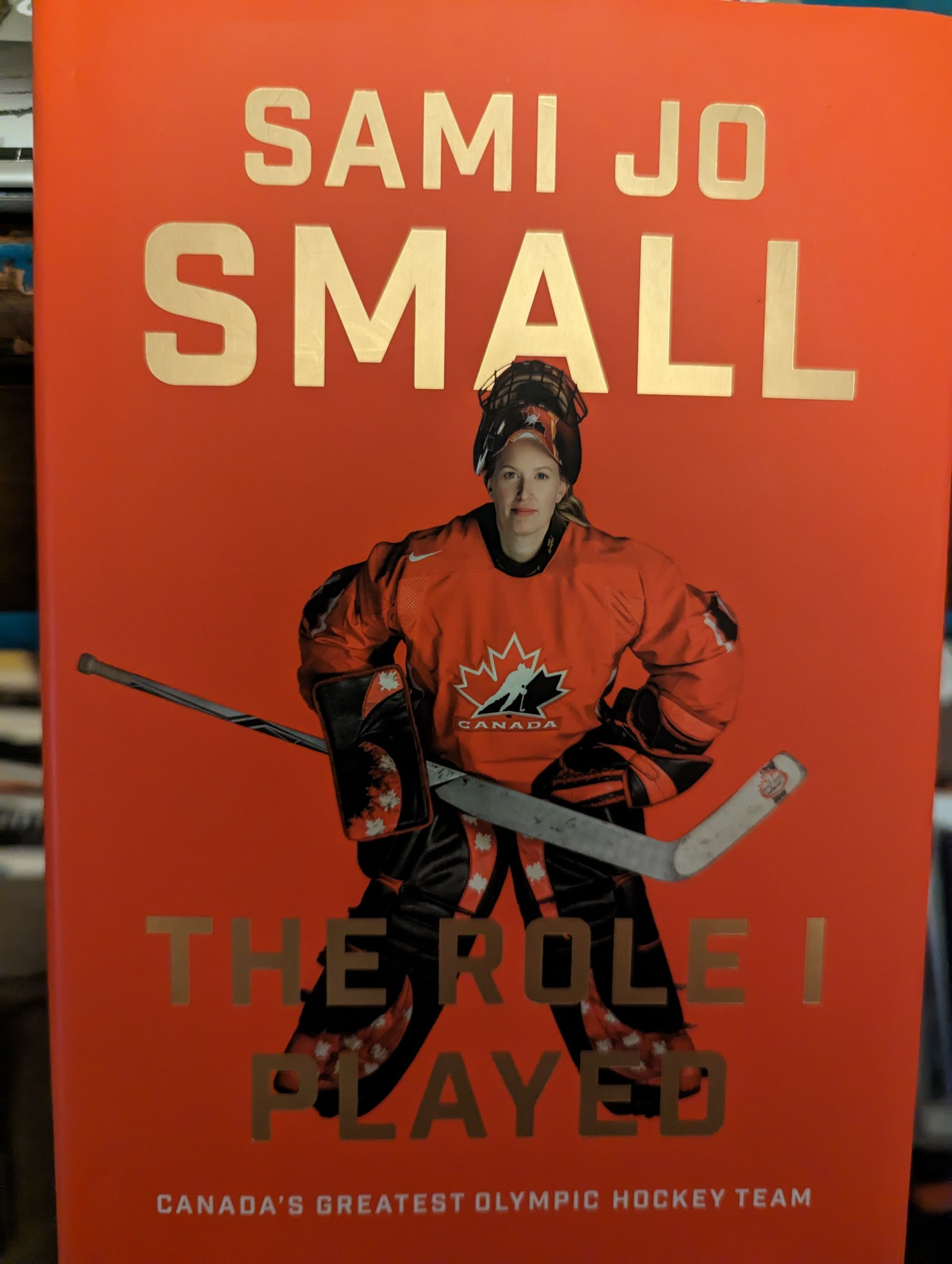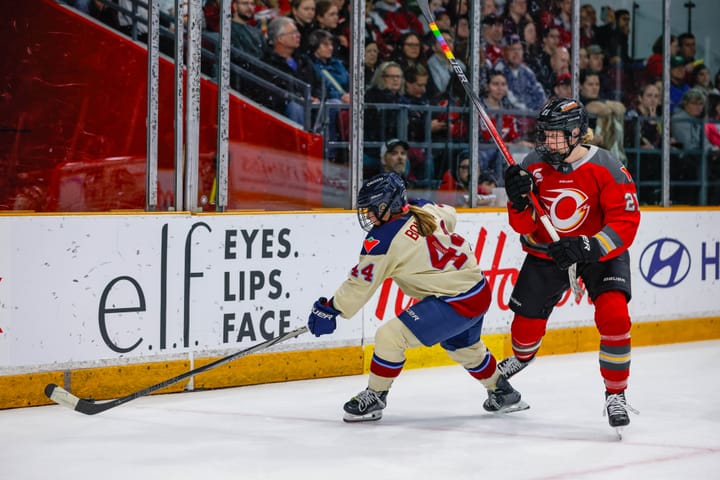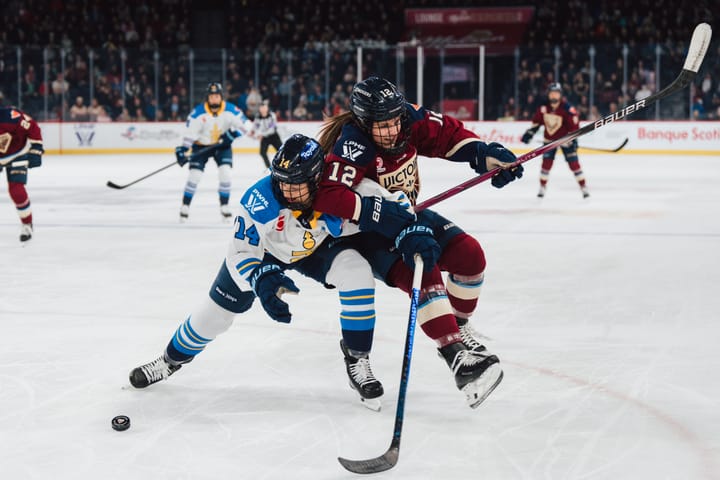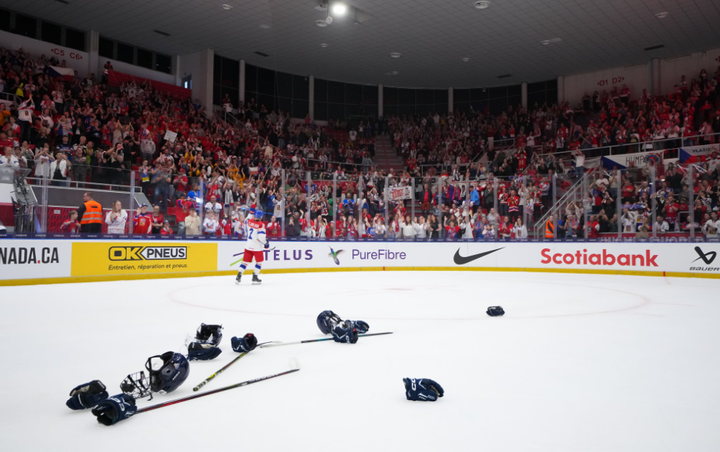Wicked Angles Book Hour: The Role I Played, by Sami Jo Small
The three-time Olympian and co-founder of the CWHL details her time with Team Canada in this memoir.

Well, here we are again – another month, another hockey player memoir.
It's difficult sometimes to find a book written by an athlete that is by turns engaging, sincere, and entertaining. Unfortunately a lot of times the writing comes off as the athlete (and their accompanying author) trying too hard to impart some valuable wisdom on the reader, something that you could potentially find on the wall of a doctor's office or on a Pinterest board.
(Can you tell I'm still a little bitter about having to read Kendall Coyne's book? Oops.)
I'm pleased to let you all know that Toronto Six president Sami Jo Small has broken the mold with her memoir, The Role I Played, about her time with the Canadian national team. The experiences are still present, the nuggets of wisdom still apparent, but it reads a lot better than many sports memoirs I've come across.

About Sami Jo
Small was, for lack of a better term, a longshot to get onto the Olympic team. A track and field athlete at Stanford, she played men's club hockey at the same time, something her coaches disapproved of until they realized it was simply unfair to make her choose. She therefore felt the need to prove she could, in fact, do it all.
The perseverance she showed – not just in athletics, but also academically, as she pursued an engineering degree at the same time – landed her the third goalie spot on Canada's first-ever Olympic women's hockey team. It also got her the degree she'd been steadily working toward, an ordeal she doesn't pepper with platitudes or make sound like light work. Lastly, it helped her preserve a place for women's hockey in Canada, as she helped found the Canadian Women's Hockey League after the first iteration of the NWHL (based in Canada) folded in 2007. This was all difficult, and she knows it – and she expects the reader to know it as well.
There isn't a story in this book that isn't told with the appropriate level of realism and grit, imparting to the reader just how difficult it is to pass a camp, earn a degree, and play at the highest level night in and night out. Small deftly describes her emotions during each drill, each conversation with her coaches, and each peak and valley as she navigates the politics and ceaseless competition that come with attempting to make Team Canada.
From there, Small details her experience of working her way up, achieving great things during the World Championships while also experiencing the setbacks any player, especially a goalie, can anticipate. She does so unflinchingly, being honest about her drive and ambition to be The Goalie for Team Canada – a feat she would get small glimpses of but never fully grasp.
I think that's the thing I enjoyed most about this book: while it's clear Sami Jo has accomplished some incredible things during her life and career, it never comes across from her as a patronizing "If I can do it, so can you!" type of message. Instead, she simply details what she experienced, good and bad, and lets the readers take away the message that they find most valuable. She treats the reader like someone who can find that message for themselves, and she doesn't shy away from describing the disappointments she has felt even while knowing she has to be a good teammate. It feels human, not contrived, and that's refreshing.
Moreover, it feels relatable; it's not someone crying over receiving "just" a partial scholarship to a very expensive D1 school, it's someone trying to process all of the very real emotions that come with not being able to fulfill a dream despite doing everything they possibly could. She does it in a way that resonates a lot more with the common person reading her words, and that makes it feel much more authentic.
About the writing and format
The book doesn't state that Small had any co-author helping her out, just an editor, so I'm assuming she did most if not all of it by herself. With that in mind, the writing reads much better than I expected – it's witty in parts, articulate, and she does a good job of setting the stage for different moments. There are some asides about teammates and other folks that can be a little repetitive or can take the reader out of the present moment, but overall, it's a pleasant experience and doesn't feel like you're slogging through.
Small goes into incredible detail at times about games and practices, and her recall is impressive. The dialogue is likely not word for word, of course, and that shows, but that's par for the course with, really, any memoir. She does a good job of placing you into the action, but be forewarned – I don't see this being super accessible for anyone not already familiar with the game to the point where they can really follow along. To the newbie or casual fan, it can be a lot to try to take in at once.
There's also a love-it-or-hate-it way that Sami Jo goes about telling her story, using flashbacks to different points in her childhood and college days to connect back to the "present-day" story she is telling in the chapter. It's really interesting in some points, but can be jarring in others, and I can see it being a distraction for some readers. Simply put, your mileage may vary.
About the anecdotes
Lastly, there are some really hilarious and heartfelt stories included here. You can tell Small has a genuine affection and respect for all of her teammates, and you get to know a little more about some of them, including Vicky Sunohara, Jen Botterill, and Cheryl Pounder. Sunohara is the comedian of the group, and Botterill becomes one of Small's closest friends on the team throughout their career. Cassie Campbell is passionate and emotional, while Hayley Wickenheiser is characterized as intense, sometimes taking her frustrations out on her linemates (and don't worry, I'll have her side of this outlined soon with my reading of her book Gold Medal Diary).
We also get to know a bit about Sami Jo's goalie partners, mostly Kim St. Pierre and Charline ("Charlie") Labonté. Small is respectful but realistic, describing them at more of an arm's-length level of detail as she explains the level of competition they went through with each other to try and make a World Championship or Olympic team. A lot of her relationship to them is described through the games they each start or get pulled from, as Small comes to the realization of just how much of her fate, careerwise, is placed in the hands of others – whether it's a goalie partner playing better, the team in front of her playing worse, or simply the decisions of the coaching staff.
Even with the tensions and low points as described in Small's story, there's a sense of togetherness and camaraderie. My personal favorite anecdote is the "squirrel bike" story at the end of Chapter 13, where a squirrel meets an untimely end during a training bike ride and Sami Jo imparts on us the importance of keeping a cool head and being there for your teammates, even if it means getting on a teammate's bike after it's been covered in squirrel guts.
Toward the end of the book, Small recounts writing notes to some of her teammates at the tail end of the Torino games in 2006, where she once again was the third-string goalie. These paragraphs are lovingly written and really go far to show the respect and admiration she has for her fellow countrywomen and teammates, even as her ride with the national team was far from the smoothest.
The final chapters go over the twilight of her career, from her unceremonious release from Team Canada and her emotions surrounding that, to the folding of the first-gen NWHL and her role in helping found the CWHL soon after. I would love to get more stories from Small about those days, though obviously only a part of her pro career overlapped with her Team Canada participation hence it not fitting here.
Finally, the epilogue covers Sami Jo's thoughts on the state of women's hockey at the time of publication. This book was published in 2020, just a year into the PWHPA's campaign to get a sustainable women's league established – and anyone who has been following the upward trajectory of the sport knows how much has changed in the ensuing three years. It obviously predates her involvement with the Premier Hockey Federation, where she's now president of the Toronto Six (the role in which a lot of people reading this will no doubt know her best by now).
Would you like buy a personalized book 📕 for someone special for the holidays? ⭐🎉🎁
— Sami Jo Small (@SamiJoSmall) December 2, 2020
Go to https://t.co/u3EqaQB20J to purchase and I'll ship it anywhere in the world. $35 + shipping. Inquire for discounts on multiple orders pic.twitter.com/eAvZsVV6C3
Therefore, some of the epilogue feels a bit dated to the time in which she was writing it, but that doesn't mean a lot of it still doesn't apply. After all, even with the PHF growing and the PWHPA on the precipice of creating its own league, nothing is ever promised when it comes to any women's sport – but particularly women's hockey. There is still a lot of work to be done, and I think Small knows that just as much as anyone – and she makes some great points about the question of conformity in a new era of women's hockey, the need to push for more representation in the Hockey Hall of Fame, and where the game can still go.
Overall
There's a lot of good to take from this memoir, and I think it can be an enjoyable experience for those not only familiar with Sami Jo Small in general, but familiar with the 1998 Olympics and Team Canada while she was playing. Those who want to know more about the original National Women's Hockey League will also get a few great tidbits toward the end of the book about her time playing there. If you're not a fan of alternating timelines or painstaking (at times) detail about games or events, you may have a bit of a tougher time than others, but I still think this is one of the better memoirs out there from a women's hockey player about her time on the ice.





Comments ()